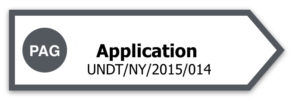Here is a very simple legal question.
Let us assume that someone – let us call him ‘A’ – has a statutory duty to make a decision on a legal matter. For whatever reason, A considers that he has a conflict of interests and should not do this, so he recuses themselves from making the decision.
Don’t worry about what the the conflict is, or how they have decided that they have one; it is enough that they have declared themselves to have a conflict of interests; A has decided that he cannot make the decision himself.
So far so good?
Under these circumstances; does ‘A’ have the authority to decide who should make the decision on his behalf?
A wants B to make the decision for him.
Yes, that’s all very fine and interesting, but what is to stop A appointing B because B has tacitly agreed that he will decide whatever A wants him to decide?
Pardon me for being a bit simplistic here, but as soon as A decides he is conflicted and cannot make the decision; should that conflict not also extend to deciding who should make the decision on their behalf?
If the conflicted decision maker has unfettered discretion as to who he can appoint in his place; where is even the appearrance of impartiality? What is to stop the decision-maker appointing this wife or husband, or his cousin or somebody he knows from his Masonic Lodge to make the decision that he believes he should not make himself?
Of course if would be different if A informed the person affected by that decision, explained that he was recusing himself and asking for that person’s consent to the decision being made by ‘B’ – but let us assume that does not happen.
The person affectect by the decision is simply presented with this as a fait accompli.
It should come as no surprise that this is what happened here.
The rules required that the disciplinary decision on the report of the Fact-Finding Panel in the graffiti-gate case made by the ASG/OHRM who was Catherine Pollard. She recused herself and passed it upstairs to her boss; the USG/Management; Yukio Takasu.
If, under those circumstances, Takasu had made the decision; that might be fair enough – but Takasu too recused himself, and made arrangements with UNICEF to have them make the decision.
Question: if Takasu was conflicted out of making the decision himself, did he have the authority to decide that his chum in UNICEF should make it for him?
This is a legal question, and in fairness, I do not really know the answer. I did not think he should, but Takasu clearly did. That was not a problem; that is why we have law courts and that is why we have judges.
So I threw that question to the Tribunal.
Management Evaluation
First we have to refer the matter to the Management Evaluation Unit. That in itself was interesting because the MEU reports directly to the USG/Management – Yukio Takasu. Now, at this juncture, you might be forgiven for interrupting and saying “Wait wait wait; the Management Evaluation Unit would have a conflict of interests reviewing a decision made by their own boss!”
Yes indeed; that’s exactly was I thought…..
Remember, of course, we are not dealing with the real world; we are dealing with the UN. The MEU did not see a problem in accepting it.
Still, there would still be the appearance of bias here, so they came up with a cunning plan; the MEU would actually do the evaluation of the decision made by their boss Takasu, but in order to make sure there was “no conflict” the evaluation was signed by Susana Malcorra, the Chief of Staff.
BRILLIANT! What could anyone possibly find wrong with that?
Takasu that came up with the idea to hand the job over to UNICEF and Malcorra that approved it, so Malcorra signed the evaluation, done by Takasu’s staff, of a decision that he had made and that she herself had approved…… and strangely enough, the found absolutely nothing wrong with the procedure and there was no ‘conflict of interests’ anywhere.
Please try not to laugh out loud.
This is the UN “justice” system in action and these people are drawing enormous salaries.
Never mind that, with the MEU hurdle out of the way, I threw the problem at the Tribunal.
There is an important legal question to be addressed here, because the problem in the UN is that too many questions arise about the impartiality of senior UN staff involved in the disciplinary process. (Look up ‘mutual back-scratching’ in an Encyclopedia; you may find a picture of the United Nations Senior Management Committee.)
And our friends at the Administrative Law Section replied, …..

